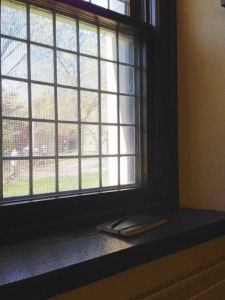In honor of National Poetry Month, my professor, Marie Howe, suggested writing a poem every day for the month of April. “Who’s up for it?” she asked our Advanced Poetry class. “It can be just a few lines. I’ll do it if you do it.”
I was in.

I decided to write a poem right when I wake up each morning – figuring this is the only way I’d consistently get it done – and to forego my computer (and its associated, infinite distractions) in favor of a pencil and notebook. Every morning, I roll out of bed, perch myself on the wide windowsill of my ground-floor room, and write a poem.
I was shocked by how easily I could reshape my early-morning habits, and how much doing so affected the rest of my day. With this new routine has come a kind of freedom: my first thought of the day is no longer my calendar or breakfast or to-do list, but something creative and unlimited. I bring this creative lens with me through the rest of the day: watching milk gush over my cereal, stepping out into the April air, listening to a lecture about respiration across the animal kingdom.
The first week of this process brought me a rush of euphoria. Poetry is easy, I thought. Poetry is everywhere! Poetry is amazing! Then, on April 12th, I began to slump. Groggy, overwhelmed, and busy with schoolwork, I woke up devoid of ideas. I sat on my windowsill and wrote a poem titled “Dear April.” This was, to put it mildly, not a love letter. On April 13th, I thought for the first time about giving up on the exercise. Why am I doing this? I asked myself. I’m sacrificing twenty minutes of blissful morning sleep – for what end?

I don’t think I’m a particularly good poet. Beyond the creative writing department on the 6th floor of New South, my passion for poetry is vaguely closeted. Many of the professors and mentors who know me in an academic or research context don’t know that I write at all. But for me, creative writing and ecology are tightly intertwined; my writing, like my research interests, often focuses on nature, its wonder, and relationships between humans and the rest of the natural world. In writing, I explore why understanding ecology and the environment is so essential and inspirational to me. I don’t write poetry to change the world. But writing poetry changes me.
So I got up the morning of April 14th and wrote something I was proud of. The next morning, I wrote something whimsical. The next, something I’d like to revisit. Each morning gave me a new gift: a window into myself and into the way I look at the world.
I used to write deliberately and infrequently — not more than once a week, and always with the intention of crafting a complete poem, something I could bring to a class workshop. But this April, poetry has permeated every day. Poetry is my first deliberate thought in the morning, and then it follows me everywhere I go. Poetry rattles in my bike chain, rustles in the bushes as I walk to class. At track practice, it settles over the stadium like a mist. At night, it coils in the warm air between my sheets.
And April keeps coming – the days of poetry flying by as fast as my JP deadline approaches, my windowsill mornings mark time in terms that are introspective, imaginative, and entirely my own.
— Zoe Sims, Natural Sciences Correspondent

